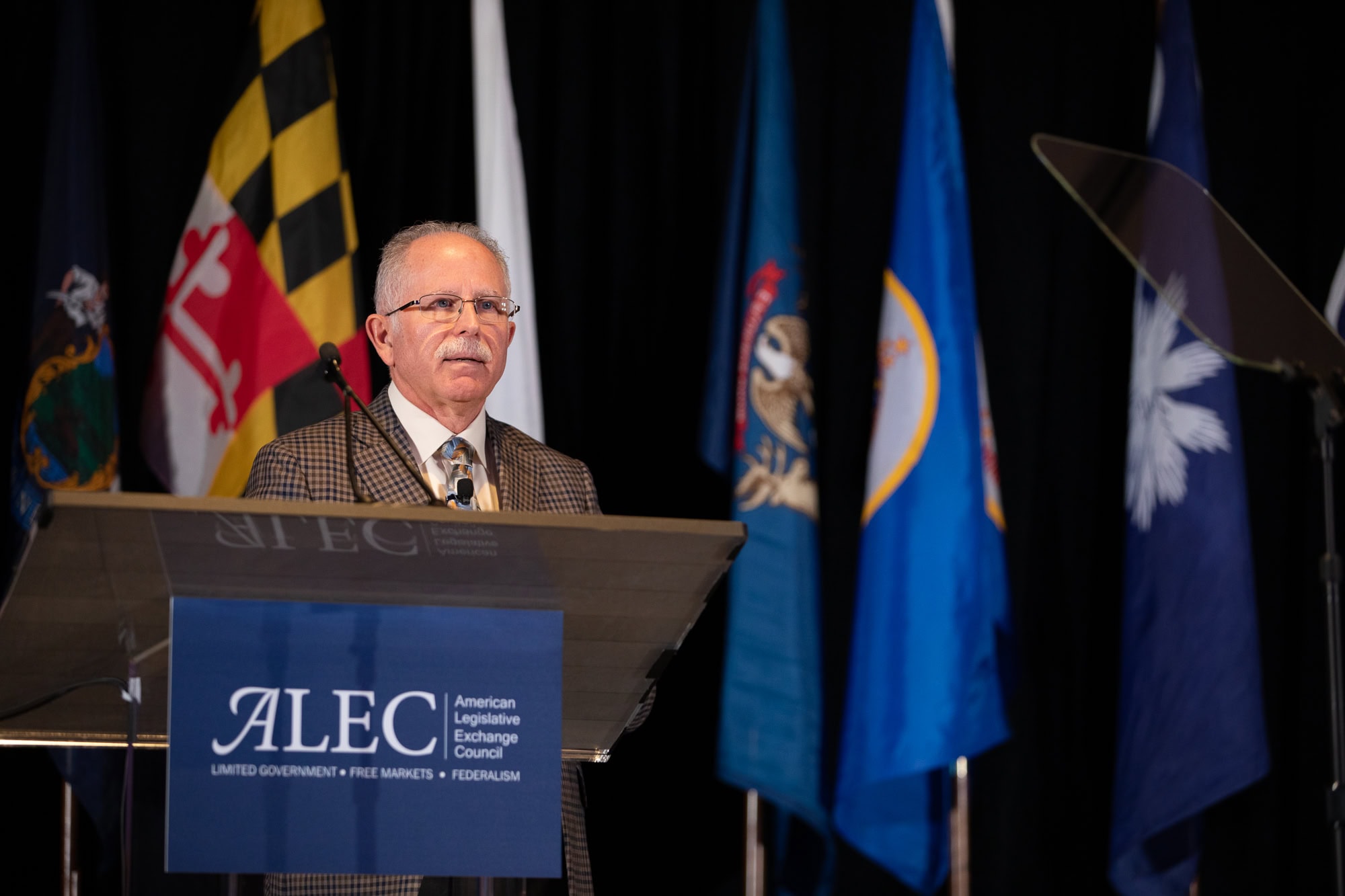ALEC’s Labor of Love: A History of Championing Worker Freedom
With a workforce as diverse as America’s, labor policy is no simple issue area, and for 50 years ALEC has been an integral part of the effort to champion free market-friendly labor policies across industries, sectors, and the spectrum of labor issues.
The first episode in the ALEC 50th anniversary video series, “Worker Freedom,” features ALEC champions Scott Walker (45th Governor of Wisconsin), Matt Hall (Michigan House Minority Leader and ALEC Board of Directors Member), and Vinnie Vernuccio (Senior Fellow, Mackinac Center), discussing ALEC’s pivotal role in securing Worker Freedom policy wins across the states.
In some states, private sector workers can be forced to join, leave, or pay fees to a union as job requirement. The Right-to-Work Act, which ALEC task forces approved as a model policy, provides a solution to this issue. It prevents private employers from requiring or banning union membership (or fees) as conditions for employment, giving workers in Right-to-Work states a guaranteed right to support a union or not to support a union without this choice affecting their hiring or job security.
Currently, 26 states have Right-to-Work laws, with West Virginia and Kentucky most recently joining the ranks of Right-to-Work states in 2016 and 2017. Michigan enacted this reform a few years earlier in 2012 (repealed in 2023), and House Minority Leader and ALEC Board Member Matt Hall explained to ALEC what prompted the reform and how Right-to-Work benefited Michigan.
At the time, Michigan led the nation in terms of people leaving the state and had lower incomes and fewer jobs. Understanding the history of Michigan and looking at what we’ve been able to accomplish over the last 10 years is critical. We’ve made our state more competitive with job growth in cutting-edge areas like manufacturing and engineering. That’s because of Right-to-Work and other economic policies that we’ve brought forward – many of which were based on ALEC model policies.

Each year, ALEC’s Rich States, Poor States takes states’ Right-to-Work status into account as it ranks the 50 states on economic outlook by comparing 15 economic policy variables. Rich States, Poor States continues to document how Right-to-Work states experience higher employment and population growth than non-Right-to-Work states.
It is also worth noting that in 2022, Tennessee built on its 1947 Right-to-Work law by enshrining it in the state constitution. Unfortunately for workers in Illinois, voters took a different route and approved a constitutional amendment in November 2022 effectively banning Right-to-Work in the Land of Lincoln.
The Illinois amendment contains another section that guarantees Illinoisians the right to collectively bargain over items that include “protect[ing] their economic welfare and safety at work.” While this might seem like a redundant guarantee of federal legislation—the National Labor Relations Act gives most American workers the right to collectively bargain—there is significant concern that the language strips the state legislature of the authority needed to keep the agreements in check and in budget.

This ability of the state legislature to avoid budget deficits by limiting collective bargaining agreements is exactly what saved Wisconsin from a budget crisis in 2011. Under Governor Scott Walker’s and state legislators’ leadership, Wisconsin passed Act 10 to address a $3.6 billion deficit. The Act repaired the budget by requiring public sector employees to contribute more for pensions and health care and, importantly, limited their ability to collectively bargain to only certain categories. As Governor Walker detailed in an interview with ALEC:
Act 10 was simply this idea of taking power out of the hands of the big government special interest, and putting it in the hands of the taxpayers, the workers, and the people that the taxpayers elect. Collective bargaining was this thing that, ironically, started in Wisconsin. It was this government-run union boss technique, that over time not only took power away, but really left the decisions in the hands of those union bosses, instead of the people we elect to run our schools, our counties, our local governments. And we said ‘no.’ We took that away. We still put more money in the schools and the local government. We gave them more flexibility, but we just didn’t want the union bosses being the one making the decisions, because they’re not elected.

ALEC was unbelievably helpful in terms of not only providing the intellectual ammunition to counter these just out-of-control attacks, but really to have trained the leaders. Someone like Leah Vukmir, a state senator who came in when I was first in office. She ended up being the national chair of ALEC. This was someone who, ALEC helped lift her up, and give her the support to be a leader in the state senate, where we needed it more than ever.

For decades, a key fight has surrounded public sector workers’ ability to exercise their First Amendment right to freedom of association when it comes to union membership. The Supreme Court’s Janus v. AFSCME ruling finally settled the matter in 2018 by banning public employers from requiring public sector workers to join or contribute to a union as a job requirement. As ALEC stated in 2018:
This ruling is a victory for free speech and individual rights. Teachers and other public sector members will now have freedom to choose to voluntarily join a union if they decide it will serve their interests, rather than endure compulsory fees to unions that put their own agenda first. Public sector unions will no longer be able to force non-members to pay bloated “agency fees” as a condition of employment.
Even with the Janus decision guaranteeing an important right for all public sector workers, the majority of states protecting workers’ Right-to-Work, and important victories like Arizona banning paid union release time, ALEC’s work is far from over.

Workers are too often unaware of their rights before making labor decisions, which results in them unknowingly forfeiting free speech rights and suffering financial losses. ALEC’s Public Employee Rights and Authorization Act strives to prevent this phenomenon. It requires that all public sector employees be informed of their right to freely join, leave, or pay a union without employment consequences and that each of these workers must give specific, affirmative consent before any money can be deducted from their wages to contribute to unions.
Other ALEC policies give workers the additional flexibility needed to pursue work solutions that work for them. The Uniform Worker Classification Act ensures that the 80% of workers who prefer their independent contractor status are able to keep it, rather than being forced into traditional employment models. ALEC’s Model Interstate-Mobility and Universal-Recognition Occupational Licensing Act allows workers to have their licenses, work experience, and private certifications recognized when they cross state lines. As ALEC has detailed extensively, the policy gives workers who have completed work with a similar scope of practice the ability to practice that same craft in a different state. Led by ALEC champions like Kansas Majority Leader Chris Croft and former Missouri State Representative Derek Grier, a growing number of states across America have now enacted this reform. Virginia became the 20th state to do so just last week, and more states like Arkansas are considering similar legislation this year.
ALEC is also supporting job creators with model policies like the Right to Start Act. This model policy reduces barriers for entrepreneurs by providing them with resources and opportunities for the first five years of business. As new businesses generate almost all net job creation in America, this reform can drive economic growth by giving business owners a helping hand.
Whatever the sector, industry, or work model, ALEC has been a champion for the rights of Americans to make labor choices that work for them. Since 1973, ALEC has joined with state legislators and private sector stakeholders to ensure rights are respected, communicated, and guaranteed. As the workforce continues to evolve and adapt with ever changing advances and models, ALEC will continue to be there to fight for worker freedom.
